When identity politics trumps the Constitution
The First Amendment is the latest casualty of the Republican Party's identity politics, and Trump's cult of personality. What can stop him?
This week, I wanted to write about how Donald Trump has used Charlie Kirk’s death to stage an alarming, party-wide and government-sponsored assault on the First Amendment and free and fair elections — and about Republican legislators’ complete capitulation to the president on the Constitution.
I ended up writing a longer essay about how we ended up in a place where group identity and partisan loyalty determine so much of the Republican Party's policy and orthodoxy, what it means for democracy that Trump can aggressively steamroll free elections and punish media companies for the content of their employees’ speech, and a little bit about a way out of this mess.
The piece is, as you might guess, a bit bleak. I try to liven it up with some memes and charts, but alas, there’s nothing funny about the death of democracy and the rule of law. Analysis is not always positive. You can put lipstick on a pig, but it’s still a pig.
So thank you for reading on this fine Friday. The events of the last two weeks really look like a turning point for the GOP and our country. It’s important to take stock of what that means and where we go from here, even if it’s not pretty.
Before moving on, let me restate one of the editorial values of Strength In Numbers, in what is becoming an increasingly common refrain of my newsletters: While I am not a partisan for any party, I am a partisan for democracy. When something or someone threatens free and fair elections or fundamental rights, I will not shy away from coverage even if it means coming off as a partisan. In keeping with the name of this site, I will try to do this with data.
I. How the Republican Party went far-right
In 2021, I wrote a post for this newsletter titled “Why did the GOP slide so far towards authoritarianism between 2011 and 2020?” The answer, in a few words, was right-wing identity politics.
Since 2011, surveys showed Republicans (particularly but not only the party’s elite opinion leaders) had increasingly defined their movement as one that opposed different left-leaning groups, particularly gay, trans, Black, and Muslim Americans. Republicans’ favorability ratings for these groups sank lower and lower from 2012 to 2024, and became increasingly predictive of primary and general election voting patterns.
By 2020, political scientists started calling these people “ethnically antagonist,” and showed they held views on a range of liberal values that were incompatible with democracy. The ethnic antagonists were more likely to agree with statements such as “strong leaders sometimes have to bend the rules to get things done” and “the traditional American way of life is disappearing so fast that we may have to use force to save it,” for example:
The defining feature of the Trump-era GOP, scholarship suggests, is a bias toward the in-group that overrides nearly every value fundamental to our democracy. The overriding psychology in the GOP today is “factionalism,” an us-vs-them mentality that places loyalty to the in-group — and the in-group’s leader — above all else.
Factionalism is what makes Republicans who decried Barack Obama’s “executive overreach” in 2012 support the president illegally deploying the National Guard/Marines to Los Angeles to “suppress” nonexistent violent riots. Factionalism is what makes it OK, apparently, for Trump to call some groups of American citizens “Marxist vermin,” who pose so grave a threat to the country that federal troops need to “liberate” cities from their local “socialist” leaders, by force.
And factionalism is what drove Republicans to completely abandon their supposed devotion to free speech this week.
II. The post-speech society
On Monday, Sept. 15, ABC late-night host Jimmy Kimmel made a pretty bad/dumb joke about the guy who allegedly murdered Charlie Kirk last week. Right-wing Twitter influencers were upset about this, as they usually are, and called for Kimmel to be canceled. Nothing much happened for about 44 hours.
Then, in a podcast episode released Wednesday, Sept. 17, Trump-appointed Chairman of the Federal Communications Commission Brendan Carr threatened to pull the license of local broadcast networks carrying Jimmy Kimmel’s late-night show. He said:
Frankly, when you see stuff like this — I mean, we can do this the easy way or the hard way. These companies can find ways to change conduct and take action, frankly, on Kimmel, or there's going to be additional work for the FCC ahead.
The “additional work” Carr alludes to is regulatory warfare. As FCC chair, Carr has nearly unilateral authority to revoke the broadcast licenses for local TV stations. For the most part, these local stations are owned not by the big networks (eg, Disney by way of ABC; Comcast via NBC), but by private broadcasting companies that affiliate themselves with the large commercial networks. The big networks make money by running the content they produce on the affiliate stations.
Carr encouraged these local stations to “pre-empt” Kimmel — that is, run other content in the time slot he’d usually air in — as punishment for his remarks. “Frankly, I think that it’s really sort of past time that a lot of these licensed broadcasters themselves push back on Comcast and Disney,” Carr remarked, “and say, ‘Listen, we are going to pre-empt, we are not going to run Kimmel anymore until you straighten this out.”
Bowing to Carr’s demands, Sinclair Broadcasting Group and Nexstar Media Group (which own hundreds of local ABC-affiliated TV stations) each said on Wednesday evening that they would indefinitely pre-empt Kimmel on the local ABC channels they control. This is a big deal for the large commercial ABC network (my former employer), since pre-empting means the network doesn’t make any money off the programming. Shortly after this, ABC corporate PR announced Kimmel would cease production immediately — and indefinitely.
In other words, all the broadcast networks caved. An employee of the U.S. Government took issue with something a late-night host said, threatened to use his government power to destroy the business of the company that employs that host, and so he got fired. It’s worth reiterating that Kimmel’s comments went unaddressed by ABC, Nexstar, and Sinclair for nearly two days after the Monday show. Things only changed after the government started calling (on a podcast — with Benny Johnson, no less) for stations to pre-empt Kimmel and ABC to fire him.
III. The right’s attack on free speech
In isolation, maybe Kimmel’s firing wouldn’t be such a big deal. You could explain the cancellation of a late-night show in any number of ways that aren’t so alarming as the government’s attack on free speech. ABC is strapped for cash (I would know), maybe he needed to go as a way to balance the books. Or maybe he really did step in it and “deserved” some sort of consequences. In a normal world, those would be fair points.
But we are not in normal times, and Kimmel’s firing is not an isolated event.
The context of Carr knee-capping Kimmel is that in the last week, most of MAGA-aligned elites have called for the punishment of people who use “unfavorable” speech about Charlie Kirk. This includes everyone from the President and Vice President to the Attorney General, Secretary of State, Speaker of the House, and on and on.
Notable examples of MAGA-aligned unelected influencers getting involved include Elon Musk, Blake Masters, and Laura Loomer — a powerful far-right activist with the ear of the president. Loomer asked Trump on X “to shut down, defund, and prosecute every single Leftist organisation.” She wrote, “If Charlie Kirk dies from his injuries, his life cannot be in vain. We must shut these lunatic leftists down. Once and for all. The Left is a national security threat.”
And there are new calls to #cancel people from their jobs based on what they post on social media. Texas Governor Greg Abbott is even pursuing action against hundreds of teachers who (allegedly) posted “inappropriate” messages about Kirk’s death. And AG Pam Bondi has said she wants to criminalize what she is calling partisan “hate speech” — which is, of course, protected by the First Amendment (it’s kinda the whole reason to have it):
And there are many other examples from just the last few days — too many to list here.
Trump, for his part, has intensified his personal attacks on the press. On Thursday, he told Jon Karl, while White House pool cameras were running, that he was hateful and that ABC should fire him next. Aboard Air Force One, the president said more networks should have their licenses pulled for airing negative coverage of him.
This is very likely a violation of the First Amendment. Also, this is straight out of the Orban playbook.
The anti-speech crusade from MAGA is also more than a little hypocritical. That will not surprise anybody who’s been watching the free-speech far right in recent years. In March, for example, JD Vance criticized the Biden administration for allegedly doing exactly what he and his allies are now doing:
And just as the Biden administration seemed desperate to silence people for speaking their minds, so the Trump administration will do precisely the opposite, and I hope that we can work together on that. […] In Washington, there is a new sheriff in town. And under Donald Trump’s leadership, we may disagree with your views, but we will fight to defend your right to offer it in the public square, agree or disagree.
“Never” indeed.
IV. Free speech is overwhelmingly popular — in abstract
Looking at the polling data, Carr and Trump are really betraying the public here. It is worth reflecting briefly on the popularity of free speech in America today:
In 2022, an Ipsos/Knight Foundation poll found that 91% of Americans believe “protecting free speech is an important part of American democracy.” Additionally 77% agreed that “having different points of view, including those that are ‘bad’ or offensive to some, promotes healthy debate in society.” Support for free speech is actually higher now than it was in 1939, during the rapid acceleration of Fascism worldwide.
Here’s a graphic from YouGov showing where Americans stand on a bunch of questions about speech.
Note that 54% of adults agree that “the biggest threat to free speech is the government.”
One likely path forward is that the American people fully reject Carr and Trump’s politicization of the FCC, because the government should not be involved in the regulation of media companies because of the content of their speech.
V. But there’s a new, partisan Constitution
The big problem, though, is that Republicans’ commitment to free speech starts to fall apart when the in-group feels threatened. According to YouGov, over the last three years, the share of Republicans who support speech with “controversial views [they] disagree with” has fallen by 18 percentage points. That’s as of February — I bet the percentage has fallen even more now.
This decline is a product of the rise of MAGA factional ideology that has now taken over the party. The rhetoric from elite opinion leaders has so delegitimized the party’s perceived opponents — the above ethnic groups, but also Democrats/progressives in general — that it’s not viewed as a rights violation to deny them the full protections of the Constitution.
This is the same thing that’s happening to due process for immigrants. When the right denies some groups their humanity or value as Americans, they are doing so so that they can deny them their rights later.
This article is brought to you by paying members of Strength In Numbers.
Independent journalism is crucial for holding people in power accountable to the facts and figures, and to the public. In our current fight for democracy, the role of the journalist is to draw attention to these trends and to fight for the people.
Join us in our fight for facts and democracy:
VI. The last best hope
To any rational voter, this about-face by Trump is going to be a big issue. Free speech was one of the most motivating issues for Republicans between 2020 and 2024. And the cultural points the party was able to score with otherwise unlikely allies — including the likes of Elon Musk — are now evaporating.
Here’s a notable example:
Tucker is absolutely right here. The fact is that once the government starts infringing on civil rights for anybody, they can do so for everybody. No one is safe. That’s not hyperbole, that’s authoritarianism.
But a government cannot rule without legitimacy. In autocracies, coups are a form of that legitimacy being ripped away, violently, from the in-group dictator. But this happens in democracies too — either through elections or revolution. In Nepal last week, anti-government protests led to the collapse of the government, the burning of government buildings, and the selection of a new temporary Prime Minister via the chat app Discord.
To avoid such a violent end, governments that have strayed too far from public opinion must adjust to feedback, either from voters or within the in-group, conferring legitimacy. And to that end… I hate to say it, but the future of U.S. free speech rights may now rest in the hands of people like Tucker Carlson.
That’s because Democrats are not going to convince Trump/Stephen Miller/Bondi/etc, to back down from their murder-induced rage against the Constitution. And GOP legislators may have a hard time wielding their own power, too, due to the sway Trump holds over their constituents. But opinion leaders that are detached from electoral accountability — journalists, heads of think-tanks, right-wing judges— may be able to speak more freely and exert their own power. Those on the inside have the best chance to convince Trump to take a step back.
This is, of course, a terrifying prospect.
The other last, best hope for democracy is elections. It’s to pin your forecast on the theory that, come 2026/2028, voters are not going to support a dictator taking away their free speech while prices of groceries and electricity hit all-time highs.
Of course, that’s only if we have free elections — and Trump can do a lot of damage in 2 years.
But I’m reasonably sure Democrats will win in the midterms, and think they’re slightly favored for the next presidential election (maybe with a probability of 55 or 60%). What Trump is doing on free speech — and on pretty much everything else in his presidency — is unambiguously unpopular. On Thursday, Sept. 18, YouGov put out results of a quick poll on Kimmel that found:
By a margin of 43% to 36%, adults thought Kimmel’s monologue on Monday was acceptable
50% of adults disapprove of ABC taking Kimmel off the air, 42% say strongly
By a margin of 43% to 26%, adults think Carr’s threat was “unacceptable”
Numbers this severely in the negative do not support a ruling party (again, if you have a free and fair democracy, which we might not have two years from now).
VII. Doomier and loopier
To quote the political scientist Lee Drutman, things just keep getting “doomier and loopeier.” Factionalism and partisan sorting have combined to pull us into an inescapable anti-democratic whirlpool, a product of a toxic two-party system and race to the bottom in our politics:
Of course, there is a pronounced partisan asymmetry in this doom loop. Republicans are responsible for a much higher share — almost all — of the degradation of our democracy and the Constitutional rule of law. Since 2000, the quality of our democracy has fallen off a cliff in Republican-leaning states:
Here in 2025, the “doom loop” is spinning almost entirely because of (a) Donald Trump’s complete conversion of the Republican Party into a cult of personality and (b) his fundamental opposition to the principles of liberal democracy.
Of course, you know what I have to say to that. To change the incentives, you have to change the system.
Conclusion
The way I see it, the downward trajectory of American democracy has been fairly predictable and path-dependent since 2016. Our two-party system incentivizes groupthink and a violent us-vs-them mentality that spurs partisan polarization, on both policy issues and political norms and values. It’s not a mystery why democracy itself is dying at the hands of partisanship. In a way, it was inevitable.
There is something we can do, but the window is narrow, and complacency will not help.
The second that Trump got away with saying he could “stand in the middle of Fifth Avenue and shoot somebody and not lose any voters," our democracy was headed down the drain. The fact is, he was right. We are still coming to grips with the full consequences of the president’s keen insight with that sentence (which is now a decade old).
So, how did we end up in the position where the Chairman of the FCC can seemingly get anyone he wants in broadcast media fired? Where the Attorney General is justifying cancel culture and state governors are purging government officials based on their social media posts?
In short, because Trump made the right to free speech and expression a question of group identity and loyalty to the Republican Party, and the man in charge, rather than a question of loyalty to the Constitution.
And if he can do that, he can do anything he wants. That’s the definition of an autocrat.



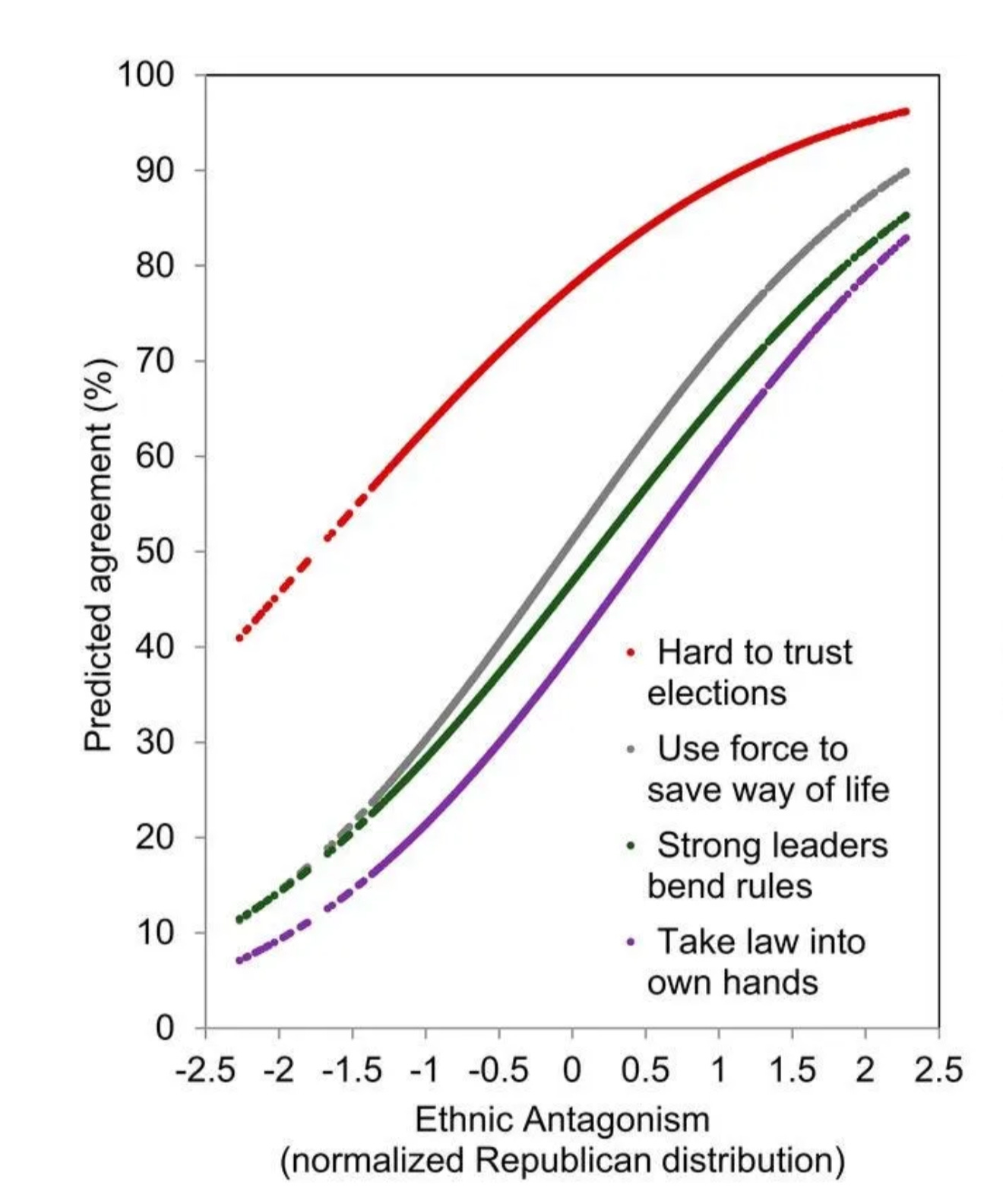
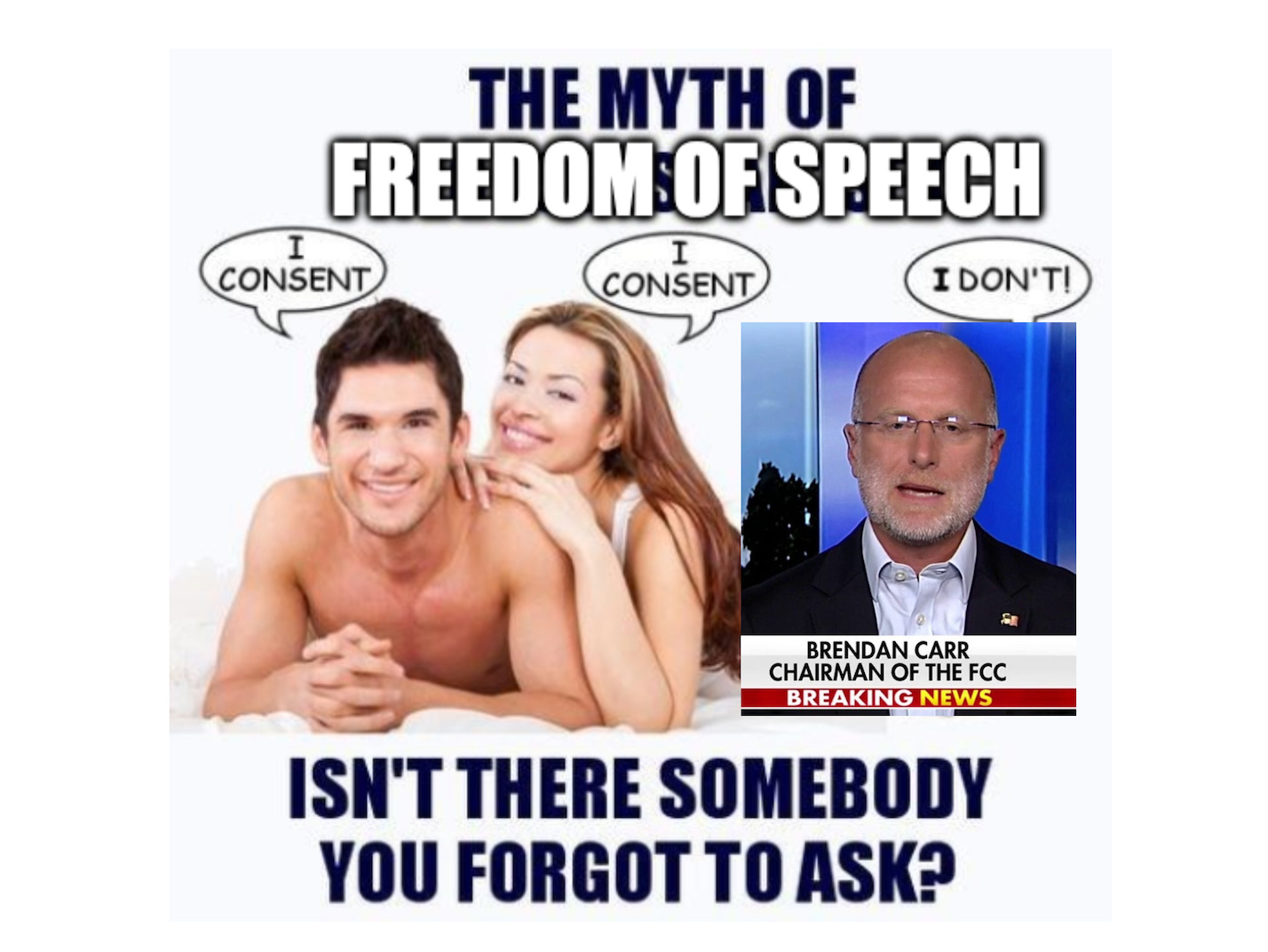
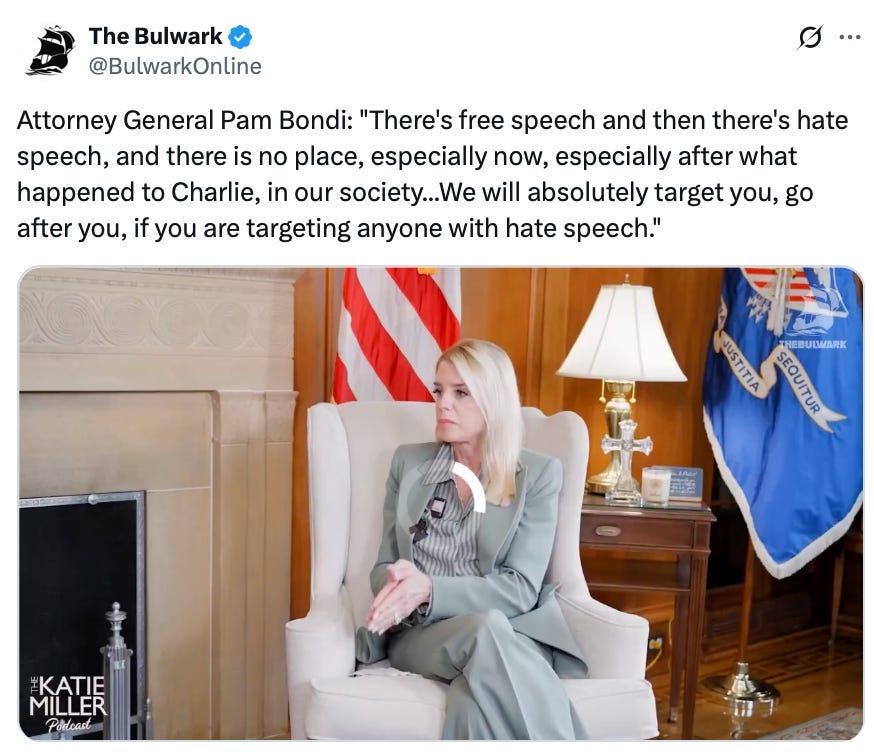
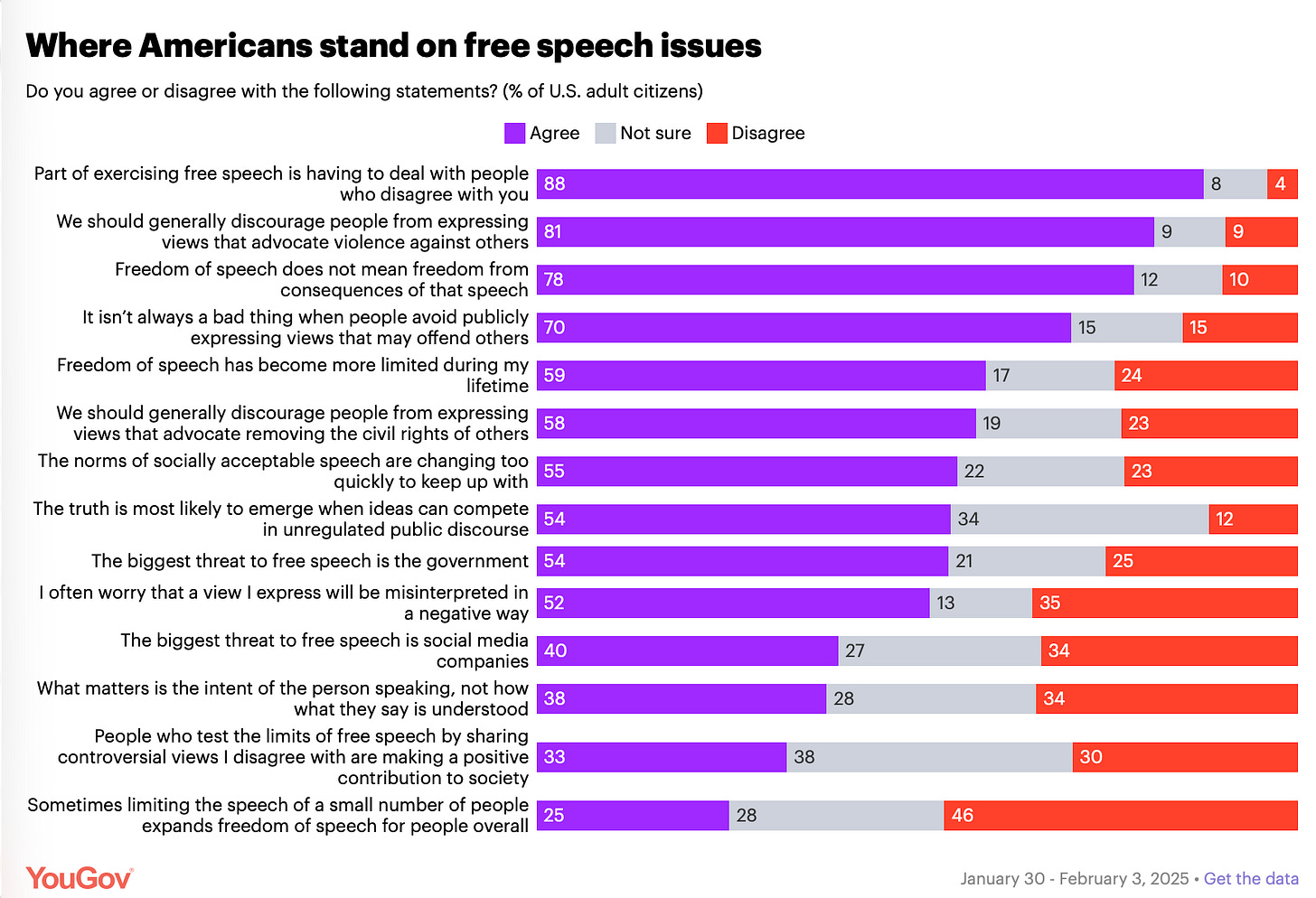
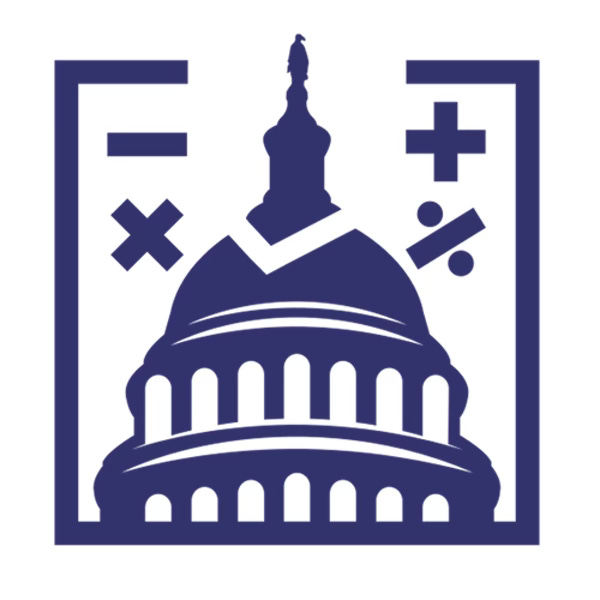
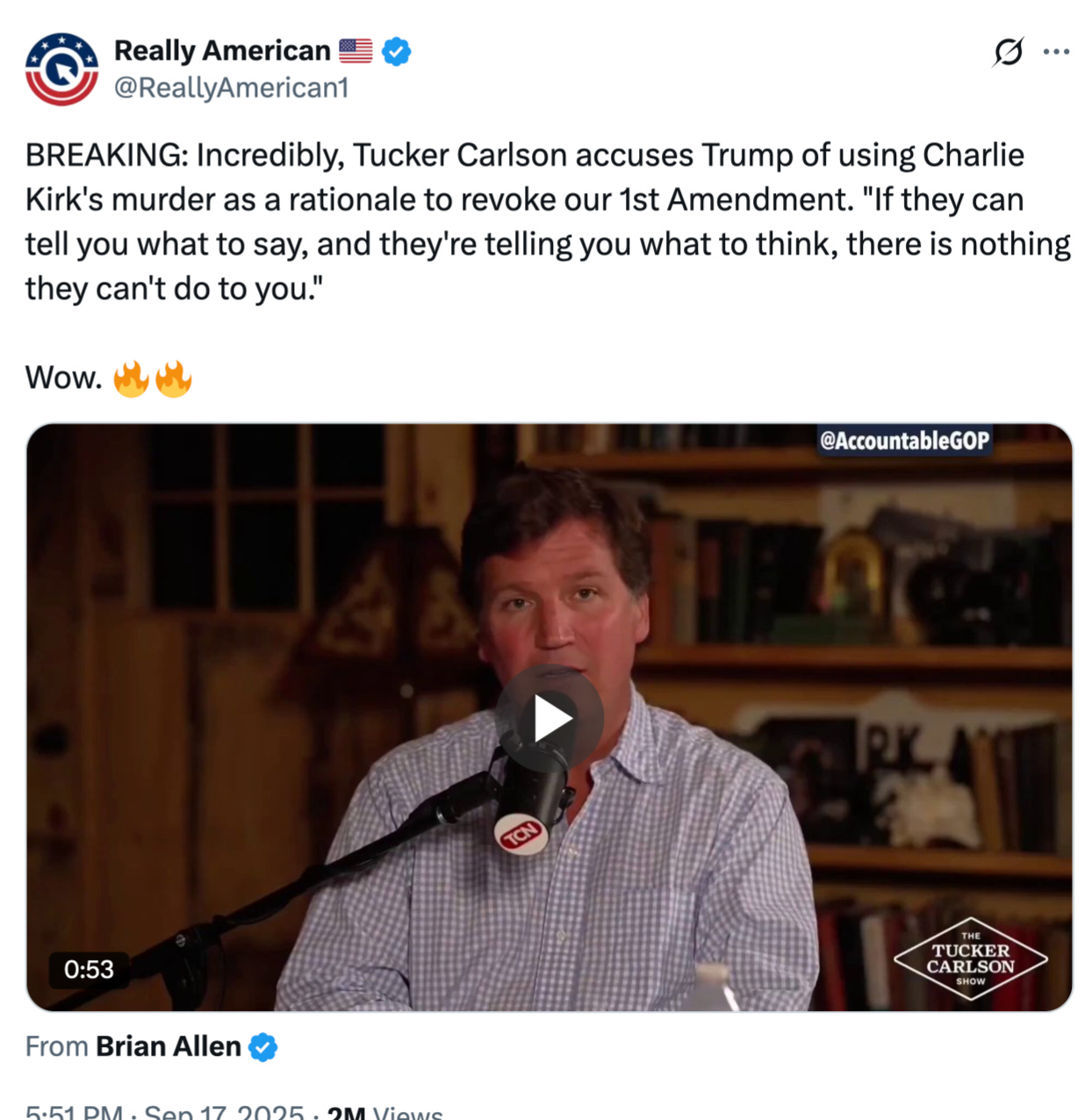
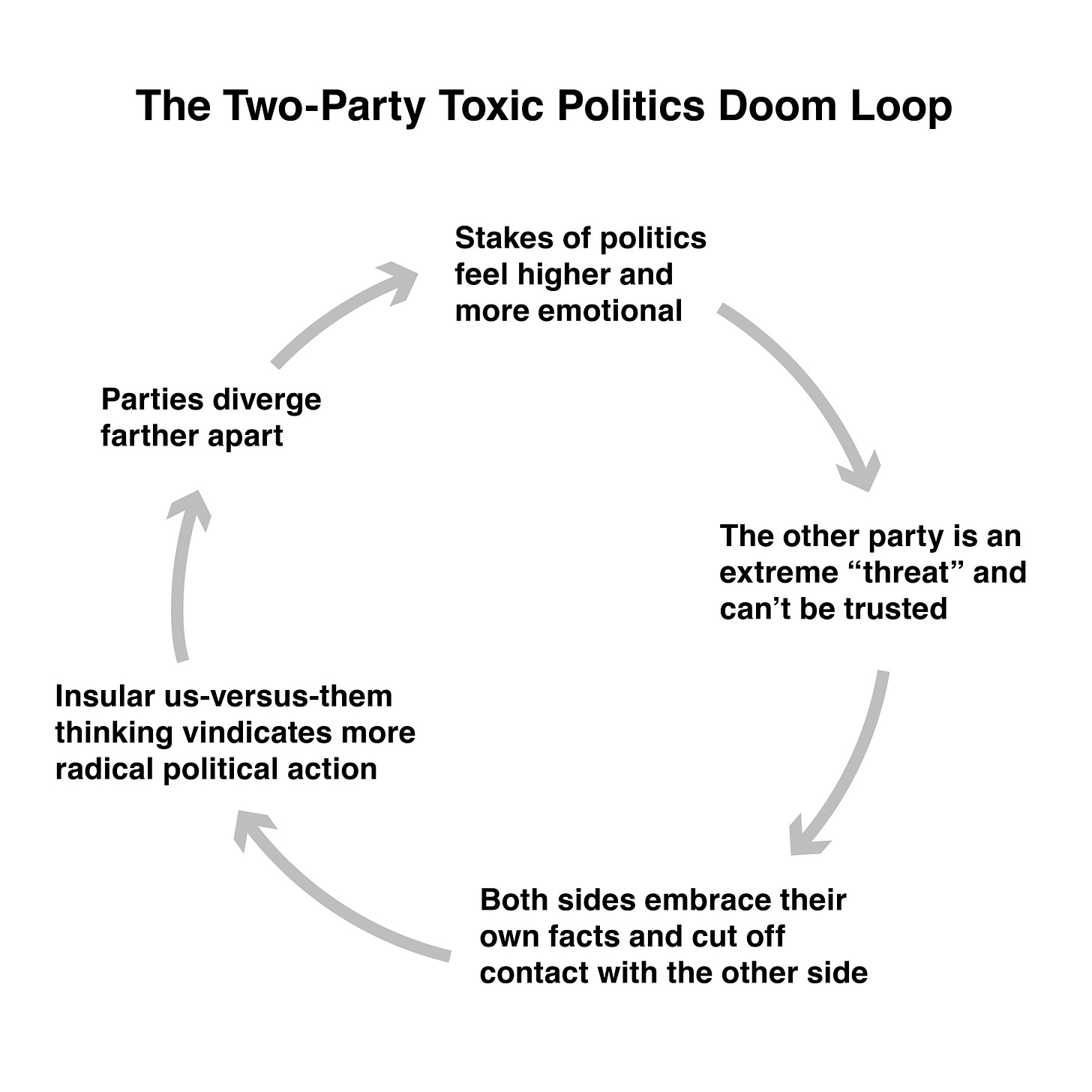
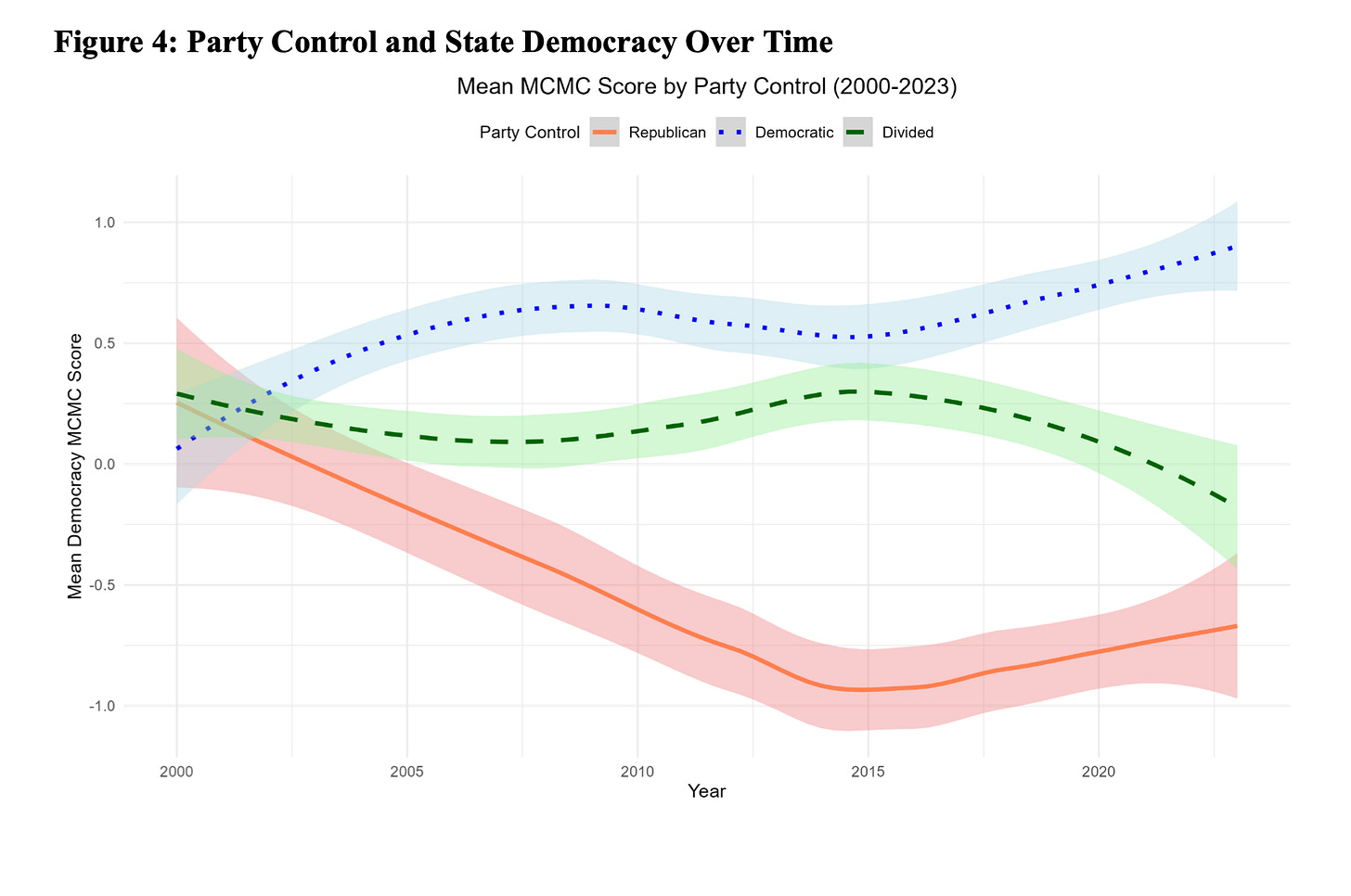
Ironically, the networks are making themselves even more irrelevant. Some of us thought they were fact checked, mildly biased and selective of their content. By firing Kimmel and Colbert, they have clearly bellowed an announcement that they are right wing tools of MAGA and corporations. In this day and age, we all have plenty of places to turn for news. The networks have chosen this moment to announce that they do not support the foundational democratic principles of free speech. I certainly will never turn them on again, not as a protest, but because they no longer offer me anything of value. They have shot their own dinosaur.
Hi Elliot, not sure if you read through the notes on your substack, but I was struck that your conclusions were that our last best hopes were people like Tucker Carlson (in group pressure) and voting. Certainly, they are key in the fight against authoritarianism, but in the case of the former, perilous given their other worldviews, and in the case of the latter dependent on the authoritarian in question not succeeding in his already concerted efforts to overthrow our free and fair elections by the midterms (gerrymandering, the so-called "SAVE" Act, voter purges, National Guard deployments during the elections for voter intimidation, voter suppression, etc.).
As I am not sure I agree entirely with your assessment above, instead I want to highlight this comment:
"There is something we can do, but the window is narrow, and complacency will not help."
On this, I very much agree, the window is narrow -- it is actually what's called the "authoritarian breakthrough."
https://www.rollingstone.com/politics/politics-features/trump-authoritarian-no-kings-playbook-1235388347/
But, on the matter of complacency...many, many of us are anything but in this moment.
I've actually been keeping a spreadsheet of opposition wins, as I see them/hear about them. I've broken the wins into categories: elections, judicial, etc. but also, specifically into examples of nonviolent civic resistance. Perhaps you've heard of the Erica Chenoweth and Maria J. Stephan’s work? They would be very much worth knowing.
https://www.journalofdemocracy.org/articles/the-future-of-nonviolent-resistance-2/
The article above is about the 3.5% rule of thumb and how in 300+ cases examined since 1900, mass defiance does in fact outperform violent counterinsurgencies when it comes to defeating authoritarian takeovers or backsliding in existing democracies.
So in my spreadsheet, I've been tracking wins that are examples of actions that undermine what are called the "pillars of support."
1) protest & persuasion
2) noncooperation (boycotts, etc.) and
3) building alternatives (community mobilization for support and protection)
In a nutshell, authoritarians follow the same, tired playbook and Yam Tits TACO is certainly no exception. But, what most of us don't know is that there is also a set of established, nonviolent counter-offensive plays that we, as members of a democracy, can deploy and which—when sustained and adopted by a broad and large enough coalition—can (and has repeatedly done) topple regimes.
At a macro level, it's worth noting a few key momentum indicators: Did you know there are literally three times (3X) as many protests now as in 2017, even if the media doesn't cover it (because they've abdicated their role as the press holding power accountable to being stenographers for the powerful, and with the recent Kimmel firing, supplicating lap dogs)?
Source: https://wagingnonviolence.org/2025/06/american-spring-nonviolent-protest-accelerating/
Also, did you know that boycotts have effectively gutted the value of both Tesla and Target, and are now laser focused on bringing down Avelo Airlines (the airline of choice for ICE's criminal abductions, trafficking and false imprisonment of our neighbors in concentration camps)?
Source: https://www.cnn.com/2025/04/28/business/things-at-tesla-are-worse-than-they-appear
At the micro level, here's one case in point of how people, ordinary, everyday Americans are standing up, speaking out and fighting back against this racist, nativist, sexist, and LGBTQ-hating regime's attacks on freedoms, families and futures:
The indictment rate for grand juries is typically 99% (there's a reason "Grand Juries could indict a ham sandwich" is a saying). However, in the regime's case, for the DOJ attorney that's brought felony criminal charges against peaceful ICE protesters that were arrested in LA—the indictment rate has been 18%!
That is huge; because it shows how the 'average' person, politically engaged or not, is doing the right thing.
The same thing is happening in D.C. (including for Sean Charles Dunn, AKA sandwich thrower).
Source: https://www.msn.com/en-us/news/us/grand-juries-reject-indictments-amid-trumps-dc-crackdown/ar-AA1LJNL3
The bottom line, opposition wins are happening. And that's not counting the ones I am sure you are far more intimately aware of than me, such as Catelin Drey's election, which swung her IA district by 21 points. Or the 40 special elections since January 1, 2025, where voters have been voting for Dems (in red, blue and purple districts) by a margin of 15.7pts over (that's in comparison to this same point—same number of races—in 2017, when the overperformance that preceded the 40+ seat blue wave of 2018 was about 12 pts).
The advice I've been following since January 20 of this year is: tune out the noise, but don't drop the signal...given this narrow window we are in, action is key.
As we face the efforts to break down our democracy and take away hard fought freedoms, I will hold onto these two quotes to continue to avoid complacency:
When everyone has just a little bit of courage, no one has to be a hero.
~ Congressmember, Sarah McBride (quoting her dad)
We are living through a revolt against the future. The future will prevail.
~ Author, Anand Giridharadas